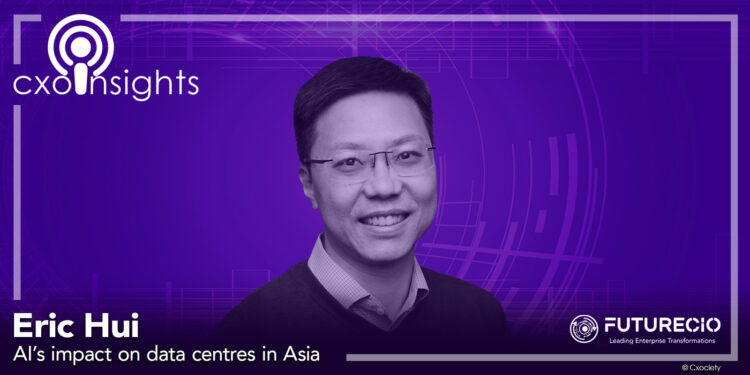The global Data Center Outlook Report from JLL suggests that the mass adoption of cloud computing and artificial intelligence is driving exponential growth in the data centre sector. The report posits that the demand for data centre capacity to support AI is growing rapidly with most research reports, indicating that the global data centre market for AI is expected to grow in excess 25% compounded annual growth rate over the forecast period.
Eric Hui, director of business development for Asia Pacific at Equinix sheds more light on the impact of AI and the boom of data centers.
Impacts of AI on data centres
Eric Hui: As far as the data centre itself, when you look at the generator API product sets, they do require a lot of these API models to be distributed. So put in different locations so that it's easily accessed by users. The models itself will require a lot of data to be trained. A lot of these data lakes and data pools have to all come together. The data centres have to be equipped and ready for it. A lot of this is helping customers to reach different locations by distribution; these can also be distributed in the locations. New data centre locations are very important.
A lot of the major cloud providers have also adopted these kinds of generated product sets as well. And to get a real and good quality of service for this kind of chat. And then generating the kind of components required a lot of direct ramps to our providers so we can do and incur less latency to get to the best quality. It's also an important element for a lot of the data centre industry.
Now, with AI helps a lot of automation. It helps with a lot of intelligence and insights so deploying all these architectures to improve and automate.
Technological requirements
Eric Hui: To support the high-performance computing kind of requirements, we know it's going to be drawing a lot more power. Even though some of the footprints itself is being more convincing, but still the power drawer is still going to be higher than before.
We are seeing a lot of the data centre providers looking at new ways of doing code. We are exploring some new facilities and we have dedicated the location of an innovation facility related to the recording. Our role is required for engineering in general.
The other thing is, of course, I mentioned distribution because again, the models are created, they'd be distributed at expectations so that we can consume it and let the prediction or the learning model continue. To address that, a lot of data companies are now looking at much more distributed, interconnected digital infrastructures, not just only for retail providers, but also the hyper scalers as well.
AI challenges and opportunities
Eric Hui: It's not just to compute infrastructure, but also, we also see a lot of other specialised hardware, some software players coming into the picture. We also see a lot of subscription models. The companies basically piece to get a subscription model for some certain kind of be our resources that come along.

"To build this AI ecosystem, the data centre providers have to embrace that there's going to be a growing ecosystem. There's a lot more engagement to help customers connect better and also realise better latency and look into data privacy."
Eric Hui
Sustainability
Eric Hui: Environmental sustainability is the cornerstone of what we were thinking about API development in the future.
At Equinix, we are looking at electricity consumption covered by renewable energies at least by night as 96%. As of 2022, and we're targeting 100% renewable energy across our global portfolio by 2030.
Now, we are also designing what we call data centres of the future. We're leveraging technology innovation to design data centres to reduce the resource assumptions and also to use high-density air, and we're calling solutions and incorporating some data centre heat recovery possible and committing to optimising data centre temperatures for operational efficiency.
The future of data centres
Eric Hui: All through the years, we have data aggregated and now we're building intelligence out of that data so that we can automate them. So I see data centers going through a transformation to become insight centers.
The other thing I also see is there's going to be a lot more businesses leveraging the services that data centres provide. Some of them will come directly as customers, some of them will subscribe to the data centre services remotely, and some of these are as a service kind of model.
We've seen a lot more customers looking into subscribing to some services, even though maybe virtual services or digital services. We will have to embrace a lot of these new technologies, and new trends coming in.
At the same time, I see governments will also have to interest in learning, coping, fostering, and enabling a lot of those policies to help the development to be better, faster and a little bit more creative.
Click on the PodChat player as Hui details the impact of AI in the boom of data centres in Asia.
1. How is Generative AI impacting the data centre (DC) industry in Asia?
a. Please identify the top 3 opportunities.
2. What are the technological requirements—design, location, etc.—for AI-ready DCs? What changes should DC operators implement to support the demand? [Segment between hyperscalers and colocation DCs]
3. What are the top 3 challenges in developing AI-ready DCs in Asia, and how do you see the industry managing the (a) challenges and (b) opportunities?
4. How well placed is the DC [hyperscalers and colocation DCs] industry to achieve sustainable growth?
5. DCs have gone through several revolutionary waves: the internet, virtualization, and the cloud. What is the future of DCs? [2024-2026]




